File Info
| Exam | Oracle Infrastructure as a Service Cloud 2017 Implementation Essentials |
| Number | 1Z0-337 |
| File Name | Oracle.1Z0-337.ActualTests.2018-09-27.60q.vcex |
| Size | 42 KB |
| Posted | Sep 27, 2018 |
| Download | Oracle.1Z0-337.ActualTests.2018-09-27.60q.vcex |
How to open VCEX & EXAM Files?
Files with VCEX & EXAM extensions can be opened by ProfExam Simulator.
Coupon: MASTEREXAM
With discount: 20%
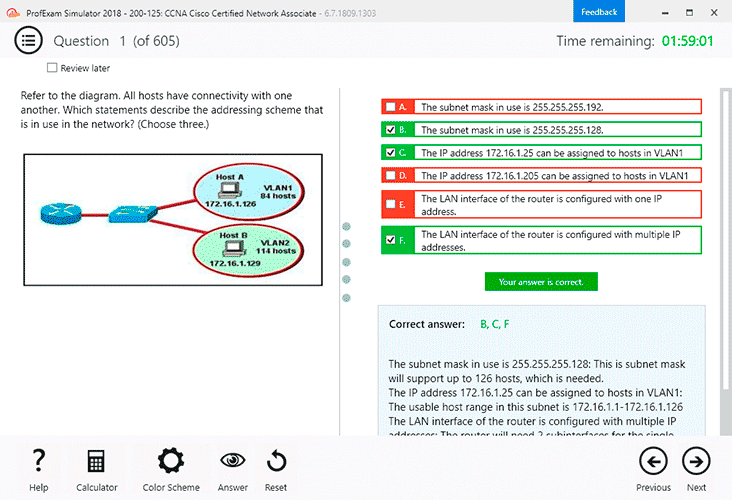
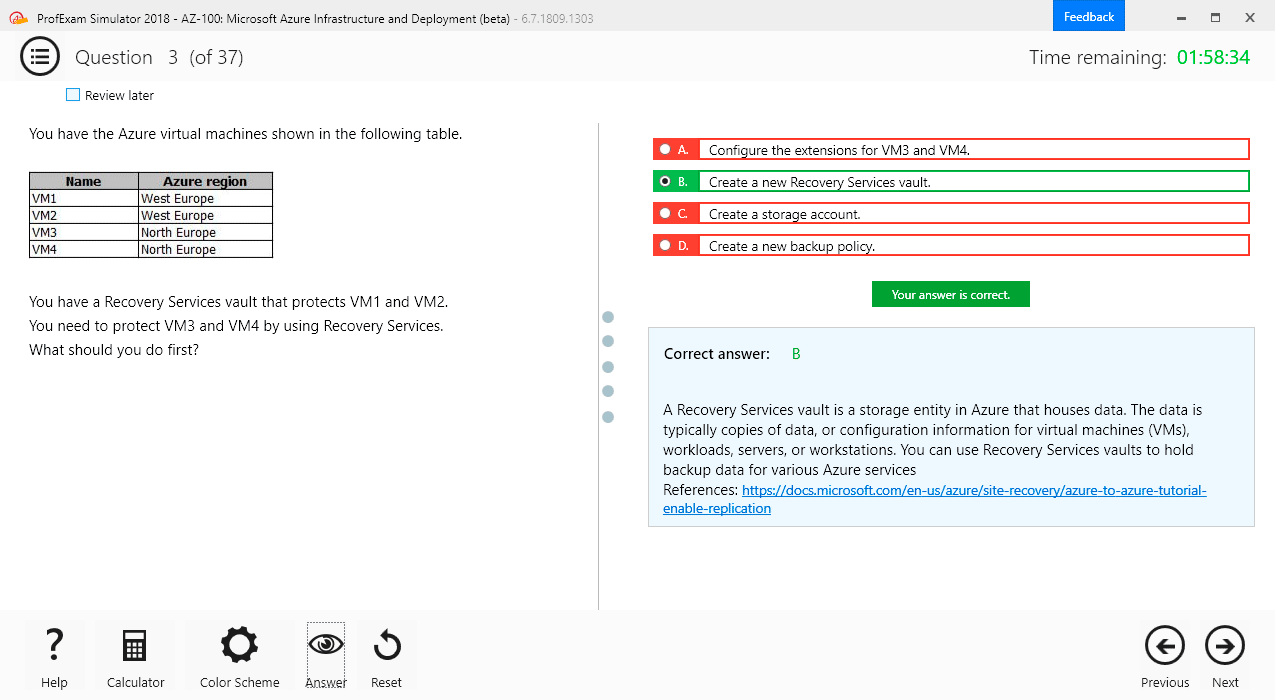
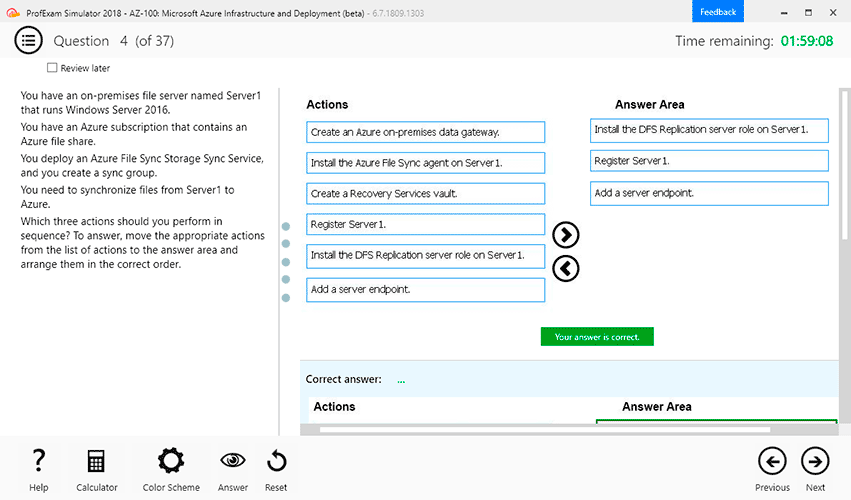
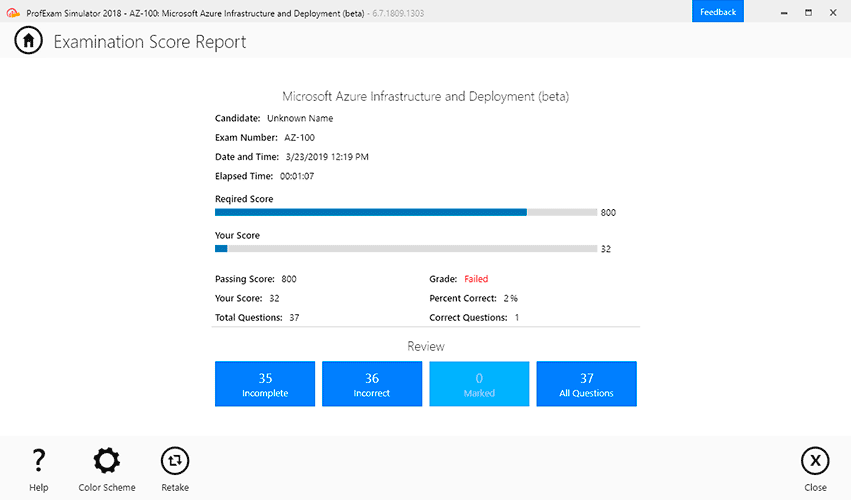
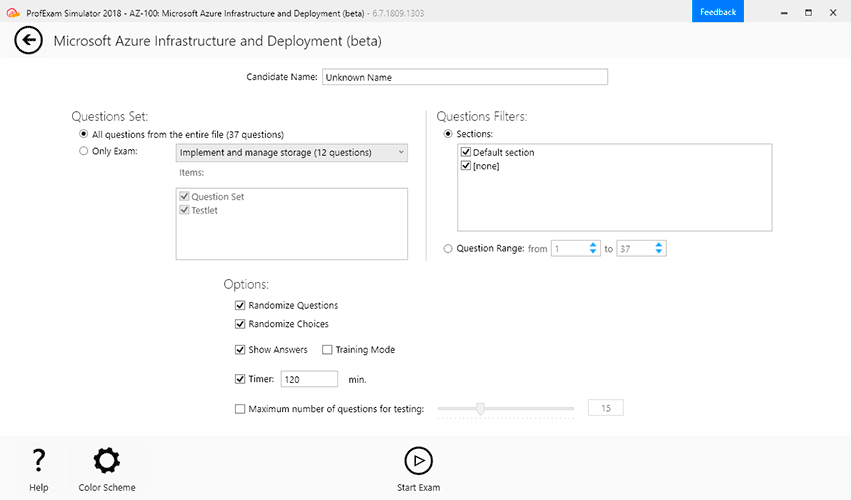
Demo Questions
Question 1
What three statements are true about IP networks and shared networks?
- Shared network private IPs can be set as static IPs via orchestration.
- A shared network allows you to communicate with the Internet; an IP network does not.
- Both types of networks allow communication to the Internet by using public IPs.
- A shared network connects to the Oracle Infrastructure; an IP network is a software-defined network.
- An IP network private IP can be set as static via orchestration.
Correct answer: ABC
Question 2
Which statement is true about private peering and public peering to connect to Oracle Cloud Infrastructure Classic via FastConnect Classic?
- Private peering allows customers to access their VMs with private IPs over a dedicated link to Oracle. Public peering allows customers to access their VMs with public IPs and private IPs.
- Private peering is an encrypted tunnel to Oracle Cloud. Public peering is over the public Internet.
- FastConnect Classic private peering is an encrypted tunnel whereas public peering is a non-encrypted tunnel.
- Private peering allows customers to access their VMs in Oracle Cloud Infrastructure Classic with private IPs and public IPs over a dedicated link.
Correct answer: D
Explanation:
Question 3
Identify two methods that can be used to control network traffic to virtual machines (VMs) using Compute Classic.
- custom routes
- identity directories
- security rules
- proxy servers
- security lists
Correct answer: AB
Question 4
Identify two use cases that are applicable to Oracle Cloud Infrastructure Dedicated Compute Classic.
- workloads requiring scalable resources and predictable performance
- moving an application to the public cloud and maintaining hardware isolation from other tenants in the cloud
- moving an application to the public cloud pinned to a specific number of VMs and of a specific type
- the Internet of Things (IoTs) and Big Data workloads
- small-scale provisioning and tearing down of virtual machines for test and development environments in the public cloud
Correct answer: AE
Question 5
Which solution would you use to establish high-bandwidth connections from a customer's data center to Compute Classic virtual machines (VMs), bypassing the public Internet?
- site-to-site VPN to a Dedicated Compute site
- a network accelerator
- You cannot set up fast connections to Oracle Cloud bypassing the public Internet.
- Oracle Cloud Infrastructure FastConnect Classic
- a T1 or T3 line from the customer's data center to Oracle Cloud
Correct answer: D
Question 6
A customer wants to deploy a stateless application in the cloud. They want to save storage costs but keep high IOPS.
In what mode must they deploy the compute instance?
- non-persistent storage/default mode
- persistent storage/ssd/gpl mode
- persistent storage/latency mode
- non-persistent storage/ssd/gpl mode
Correct answer: D
Question 7
What information do you need to make an HTTP request using the Compute Classic REST API?
- open port 8080 on the firewall by using the RESTport utility, which is referenced in the welcome email after the subscription
- a REST endpoint URL of the site or region in which you want to manage Compute Classic resources
- a private key, which is generated at the time the subscription was activated
- the TCP/IP address of the instance, which is obtained from Oracle Cloud My Services
Correct answer: B
Explanation:
Reference https://docs.oracle.com/en/cloud/iaas/compute-iaas-cloud/stcsa/SendRequests.html Reference https://docs.oracle.com/en/cloud/iaas/compute-iaas-cloud/stcsa/SendRequests.html
Question 8
Which three are required to successfully connect to a customer third-party VPN device (for example, Juniper, CISCO, or Palo Alto)?
- location of the device
- phase 1 and phase 2 time-outs
- WAN IP of the device
- host name of the device
- passphrase
Correct answer: BCD
Question 9
Identify three steps that you must perform when creating a Linux instance in Compute Classic by using an Oracle-provided image.
- Generate an SSH key pair.
- Obtain an Oracle Cloud Infrastructure Compute Classic trial or subscription account.
- Ensure that you are assigned the Service Administrator role.
- Register the machine image.
- Specify a username and password to access the instance.
Correct answer: ABC
Question 10
You have provisioned and configured FastConnect Classic. Identify the two tasks that you will perform before using the service for the first time.
- Contact your Oracle sales representative to get the required credentials for using the service.
- Test if data is being transmitted over the network connection that is set up and not over the public Internet.
- Test failover procedures on the network.
- Order redundant connections.
- Contact Oracle to run tests on your behalf and wait for Oracle to confirm that you can start using the service.
Correct answer: BC
Explanation:
Reference https://docs.oracle.com/en/cloud/get-started/subscriptions-cloud/ofcug/using-oracle-cloud-infrastructure-fastconnect-classic.pdf (19) Reference https://docs.oracle.com/en/cloud/get-started/subscriptions-cloud/ofcug/using-oracle-cloud-infrastructure-fastconnect-classic.pdf (19)

